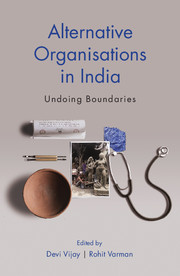Book contents
- Frontmatter
- Dedication
- Contents
- List of Tables and Figures
- Acknowledgements
- Chapter 1 Introduction: Undoing Boundaries
- Chapter 2 Formal and Informal Technologies of Alternative Organisational Spaces within the State: An Analysis of Violence, Wrongdoing and Policing
- Chapter 3 Scripting Alternative Images: Institutions, Practices and Scripts of the Mritshilpis of Kumortuli
- Chapter 4 Shelter for Homeless: Ethnography of Invisibility and Self-exclusion
- Chapter 5 Alternative Spaces of Employment Generation in India: Informal Rules, Structures, and Conflicting Organisational Requirements
- Chapter 6 Shaheed Hospital: Alternative Organisation, Ideology and Social Movement
- Chapter 7 Acting for Change: A Circuits of Power Analysis of a Denotified Nomadic Tribe and Budhan Theater's Struggle for Change
- Chapter 8 Swaraj: An Alternative University
- Chapter 9 Alternative Organisations: Spaces for Contestation
- Contributors
- Index
Chapter 9 - Alternative Organisations: Spaces for Contestation
Published online by Cambridge University Press: 05 April 2018
- Frontmatter
- Dedication
- Contents
- List of Tables and Figures
- Acknowledgements
- Chapter 1 Introduction: Undoing Boundaries
- Chapter 2 Formal and Informal Technologies of Alternative Organisational Spaces within the State: An Analysis of Violence, Wrongdoing and Policing
- Chapter 3 Scripting Alternative Images: Institutions, Practices and Scripts of the Mritshilpis of Kumortuli
- Chapter 4 Shelter for Homeless: Ethnography of Invisibility and Self-exclusion
- Chapter 5 Alternative Spaces of Employment Generation in India: Informal Rules, Structures, and Conflicting Organisational Requirements
- Chapter 6 Shaheed Hospital: Alternative Organisation, Ideology and Social Movement
- Chapter 7 Acting for Change: A Circuits of Power Analysis of a Denotified Nomadic Tribe and Budhan Theater's Struggle for Change
- Chapter 8 Swaraj: An Alternative University
- Chapter 9 Alternative Organisations: Spaces for Contestation
- Contributors
- Index
Summary
Markets, today represent not just arenas of exchange but a way of life that organises activities based on values assigned (explicitly or implicitly) by the market (Sandel, 2012). In the veneer of economic objectivity and value neutrality, market-based values continue to displace other values that emphasise different sensitivities and alternate normative forms of organising society. The ecological destruction resulting from the deepening of ‘market societies’ is tangible and increasingly indisputable. And so are the inequalities that appear to be the natural (and perhaps celebrated) outcomes in such societies. While the glaring and pernicious effects have been alarmingly met with indifference and an inertial bias for the status quo, it has also been met with organisations that seek to challenge what is increasingly apparent as a dangerous way of life.
In this chapter, we study organisations seeking to promote social change that forces them to engage with markets, even while they resist the dominant principles characterising the markets in which they work are based. Despite subscribing to visions of development that are clearly inconsistent with those promoted by dominant discourses of market-based development, these organisations have no option but to engage with markets. In doing so, they often have to reject mainstream measures of success and constantly strive to challenge the market structures even as they continue to operate in them and perhaps even depend on them to achieve their goals. Conventional frames of understanding organisations may lead us to unfavourable views of such organisations, in comparison with others who might be operating in the same spaces, with greater alignment with dominant market logics. However, we argue this would be severely underestimating the work such organisations do. Instead, they reflect more on the measures used and the horizons privileged by these measures than the societal and ecological value created by such organisations.
While we do not think that such contestations are limited to only these, the organisations we focus on this chapter are Dastkar Andhra (DA) and its sister organisations: Selco Solar Limited (Formerly, the Solar Electric Light Company, India), Decentralised Cotton Yarn Trust (DCYT) and Pratham Books. The Oxford Dictionary defines contestation as ‘the action or process of disputing or arguing’.
- Type
- Chapter
- Information
- Alternative Organisations in IndiaUndoing Boundaries, pp. 225 - 244Publisher: Cambridge University PressPrint publication year: 2017



